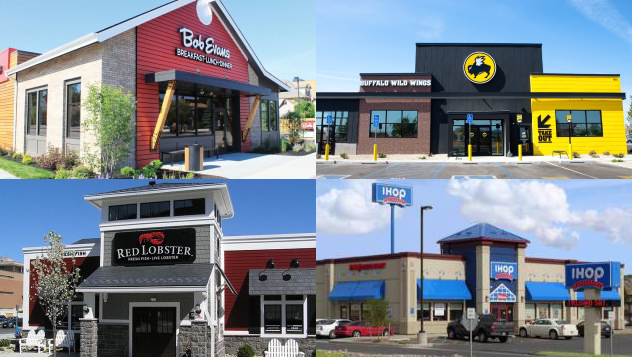
CHICAGO—Cap rates in the net lease casual dining restaurant sector increased 25 bps points to 6.0% in the first quarter of 2017 when compared to the first quarter of 2016, according to a new report from the Boulder Group, a net lease firm based in Northbrook, IL. These tenants have become more popular with retail operators in the past few years because, unlike many outlets, they can't be harmed by e-commerce. But an increase in the number of franchisee-backed restaurants helped push up cap rates.
Investors consider corporate-backed restaurants to be a better credit risk. Casual dining restaurant properties with corporately-guaranteed leases had cap rates of 5.75%, while franchisees were priced 50 bps higher at 6.25%, Boulder found. And In the first quarter of 2017, franchisee backed casual dining restaurants accounted for 49% of the overall supply of casual dining restaurants, compared to 31% one year ago.
“Last year there was a greater percentage of large corporate sale leasebacks that moved the market,” Randy Blankstein, president of Boulder, tells GlobeSt.com. “The current corporate/franchisee breakdown percentage is back closer to historical norms.”
But on average, casual dining establishments are still more desirable than other net lease properties. However, the cap rate premium associated with the casual dining sector when compared to the overall net lease market declined to 19 bps from 43 in the first quarter of 2016.
Some casual dining tenants have experienced troubles, Blankstein says. “Applebee's and Ruby Tuesday have company-specific issues that relate to same store sales. Many credit the issues with the chains to be menus that don't have the same appeal with millennials as they have with their older customer base.” Furthermore, “the industry is suffering from previous overexpansion that will likely result in some consolidation in the next year.”
As a result, “investors need to be laser focused on current store sales and make sure to target restaurants with healthy rent to sales ratios.” But as long as investors choose carefully, the sector still has many advantages.
“Casual dining properties frequently exhibit absolute triple net leases and rental escalations during their lease term,” according to the latest Boulder report. And “private and 1031 buyers remain the most aggressive purchasers of net lease casual dining assets due to their absolute price points. Outside of portfolio sales, private buyers accounted for 70% of net lease casual dining transactions in the first quarter of 2017. “
Private investors will continue favoring casual dining properties with corporate leases or franchisees with significant operational experience. And although REITs and institutional investors are not as important in this sector, Boulder believes they will continue seeking larger portfolios of casual dining restaurant properties via sale leaseback transactions.

CHICAGO—Cap rates in the net lease casual dining restaurant sector increased 25 bps points to 6.0% in the first quarter of 2017 when compared to the first quarter of 2016, according to a new report from the Boulder Group, a net lease firm based in Northbrook, IL. These tenants have become more popular with retail operators in the past few years because, unlike many outlets, they can't be harmed by e-commerce. But an increase in the number of franchisee-backed restaurants helped push up cap rates.
Investors consider corporate-backed restaurants to be a better credit risk. Casual dining restaurant properties with corporately-guaranteed leases had cap rates of 5.75%, while franchisees were priced 50 bps higher at 6.25%, Boulder found. And In the first quarter of 2017, franchisee backed casual dining restaurants accounted for 49% of the overall supply of casual dining restaurants, compared to 31% one year ago.
“Last year there was a greater percentage of large corporate sale leasebacks that moved the market,” Randy Blankstein, president of Boulder, tells GlobeSt.com. “The current corporate/franchisee breakdown percentage is back closer to historical norms.”
But on average, casual dining establishments are still more desirable than other net lease properties. However, the cap rate premium associated with the casual dining sector when compared to the overall net lease market declined to 19 bps from 43 in the first quarter of 2016.
Some casual dining tenants have experienced troubles, Blankstein says. “Applebee's and Ruby Tuesday have company-specific issues that relate to same store sales. Many credit the issues with the chains to be menus that don't have the same appeal with millennials as they have with their older customer base.” Furthermore, “the industry is suffering from previous overexpansion that will likely result in some consolidation in the next year.”
As a result, “investors need to be laser focused on current store sales and make sure to target restaurants with healthy rent to sales ratios.” But as long as investors choose carefully, the sector still has many advantages.
“Casual dining properties frequently exhibit absolute triple net leases and rental escalations during their lease term,” according to the latest Boulder report. And “private and 1031 buyers remain the most aggressive purchasers of net lease casual dining assets due to their absolute price points. Outside of portfolio sales, private buyers accounted for 70% of net lease casual dining transactions in the first quarter of 2017. “
Private investors will continue favoring casual dining properties with corporate leases or franchisees with significant operational experience. And although REITs and institutional investors are not as important in this sector, Boulder believes they will continue seeking larger portfolios of casual dining restaurant properties via sale leaseback transactions.
Want to continue reading?
Become a Free ALM Digital Reader.
Once you are an ALM Digital Member, you’ll receive:
- Breaking commercial real estate news and analysis, on-site and via our newsletters and custom alerts
- Educational webcasts, white papers, and ebooks from industry thought leaders
- Critical coverage of the property casualty insurance and financial advisory markets on our other ALM sites, PropertyCasualty360 and ThinkAdvisor
Already have an account? Sign In Now
*May exclude premium content© 2025 ALM Global, LLC, All Rights Reserved. Request academic re-use from www.copyright.com. All other uses, submit a request to [email protected]. For more information visit Asset & Logo Licensing.








